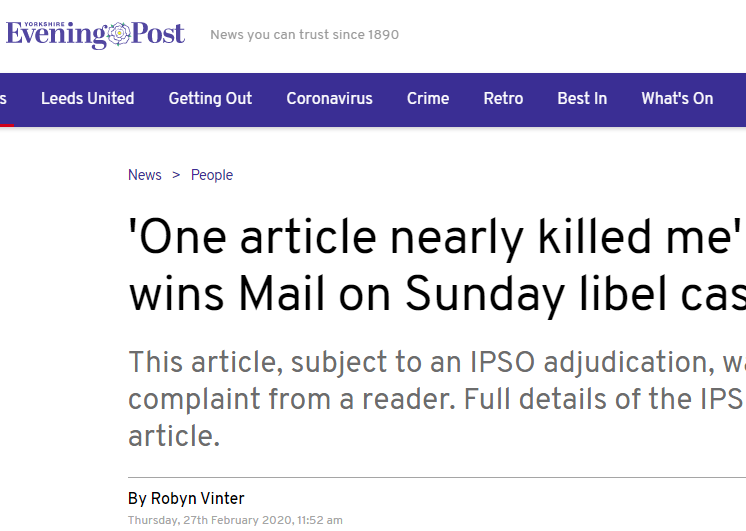
The Yorkshire Evening Post breached the IPSO Editors’ Code after reporting the erroneous claim that someone had schizophrenia.
The Independent Press Standards Organisation ruled it was a breach of privacy and accuracy rules as the woman had not been diagnosed with any mental illness and, although she was unnamed in the Post’s story, was identifiable by people in her local community.
A Yorkshire woman won substantial libel damages from the Mail on Sunday in February last year after she was named and pictured as a case study in an article about “rogue beauticians” and “cosmetic cowboys”.
She was then interviewed by the Yorkshire Evening Post about what had happened, telling the paper that it all started after a customer complained about her beauty treatment, tried to take her to trading standards and then “threatened to go to the papers”.
The online version of the article reported that the beautician had been unable to take any action against the customer because she had been diagnosed with schizophrenia.
The woman said she and her family had been contacted by readers who had identified her, “causing great distress”, because her original complaint was posted on social media under her own name.
IPSO ruled that the woman had been identifiable and that the “sensitive and serious” claim about her health constituted an intrusion into her private life under Clause 2 (privacy) of the Editors’ Code of Practice.
“A person’s diagnosis with a serious mental health condition is unquestionably information relating to their health, and the complainant had a reasonable expectation that any such information would remain private, notwithstanding that she denied the accuracy of the claim in this instance,” IPSO’s ruling said.
“The complainant had not consented to publication of this information, and the committee did not consider that presenting the interviewee’s position on a dispute relating to the provision of a beauty treatment constituted adequate justification for including allegations – which were disputed – about the complainant’s mental ill-health without consent.”
IPSO also ruled the Post should have taken steps to verify its interviewee’s claim, even though it was presented as a quote from her, because of the seriousness of it. The failure to do so resulted in a breach of Clause 1 (accuracy) of the code.
The Post offered to amend the article to make clear the schizophrenia diagnosis was only what Hindley had been “led to believe”.
However IPSO said this amounted to a further breach of the code as it did not admit an inaccuracy had been published, did not signal that an amendment had been made, and did not correct the record to say the woman had not been diagnosed with schizophrenia.
IPSO ordered the Post to publish a correction to appear on the top half of its homepage for 24 hours.
Email pged@pressgazette.co.uk to point out mistakes, provide story tips or send in a letter for publication on our "Letters Page" blog






